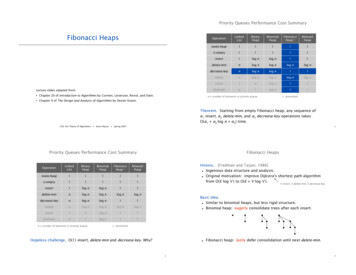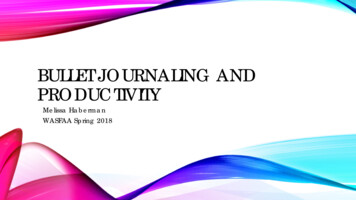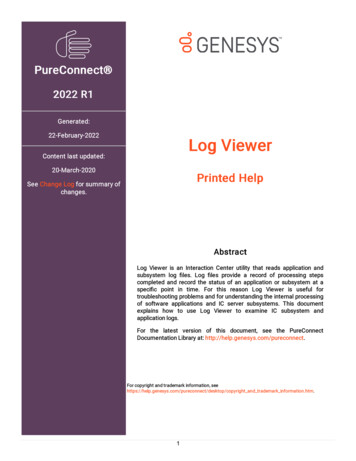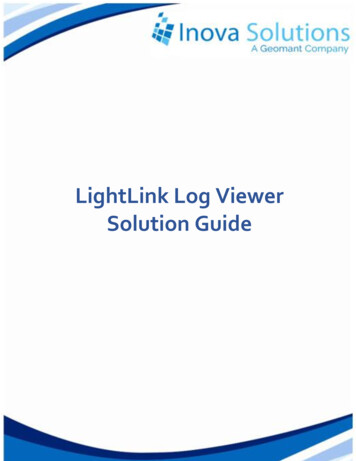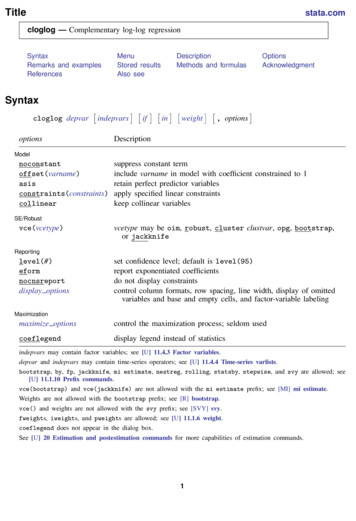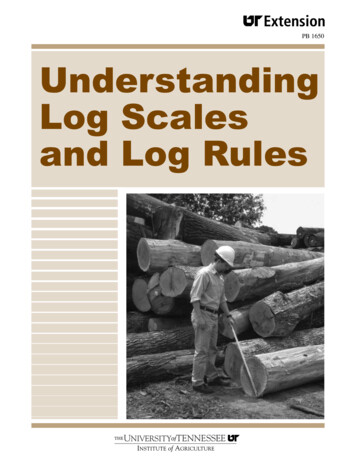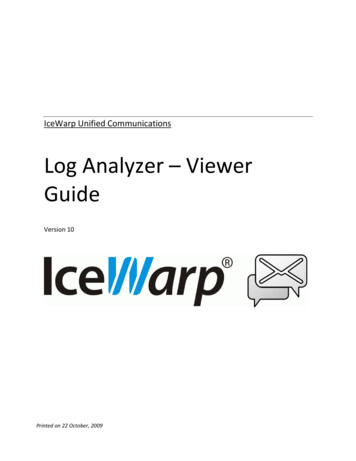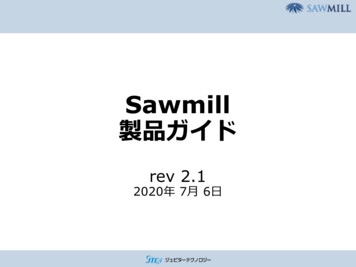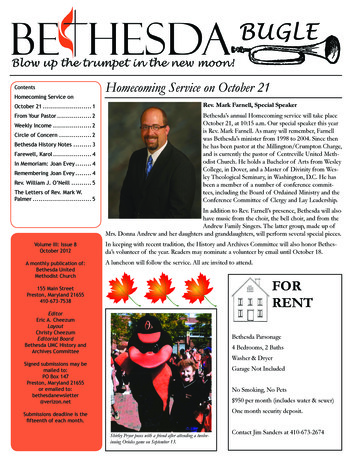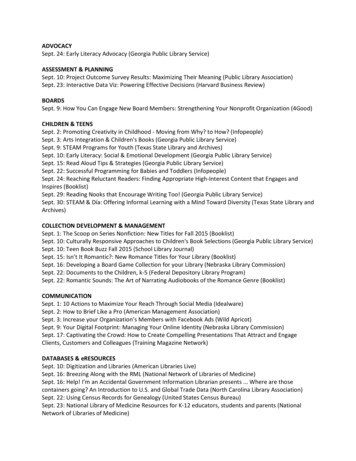
Transcription
1University of FloridaCollege of Public Health & Health Professions SyllabusFall 2018 STA 6177: Applied Survival Analysis (3 credits)Delivery Format: On CampusT 9th period in HPNP G-114 and R 8-9th Periods in HPNP G-312Course Content in E-Learning using CANVAS: http://elearning.ufl.eduInstructor Name:Room Number:Phone Number:Email Address:Office Hours:Dr. Robert ParkerCTRB 5219Preferred Course Communications:E-mail in CANVASTA:Haocheng Ding352-294-5906rlp176@ufl.eduM 6th Period CTRB 5219 or by appointmentPrerequisites: STA 6327: Introduction to Theoretical Statistics II or PHC 6092: Introduction to BiostatisticalTheory or Permission of the InstructorPURPOSE AND OUTCOMECourse Overview: This course discusses “time to event” data, where the event can be response totreatment, relapse of disease, or death. This course will introduce the basic concepts and statistical methodsused for survival data. Topics include censoring, Kaplan-Meier estimation, log-rank test, Cox proportionalhazards regression model, accelerated failure time model and competing risks. Statistical analyses will beperformed using R.Relation to Program Outcomes: This course provides the knowledge to interpret and apply biostatisticalmethods needed to analyze time to event data.Course Objectives and/or Goals:Upon successful completion of this course, students should be able to:1. Apply and interpret one sample methods for survival data including the Kaplan-Meier and NelsonAalen estimators.2. Apply and interpret methods to compare two or more groups with a time to event response,including the log-rank test and weighted alternatives.3. Apply, build and interpret regression models for survival data including the accelerated failure timemodel, Cox model and extensions.4. Apply and interpret model diagnostics for regression models with survival data.Instructional Methods: Lectures with slides, data analysis demonstrations in R, and whiteboard use will bepresented live. Homework assignments and exams will be provided through CANVAS in E-learning.DESCRIPTION OF COURSE CONTENTCourse MaterialsThere will be no assigned textbook for this class; however, the following list provides some useful references Survival Analysis: Techniques for censored and truncated data (Statistics for biology and health) byJohn P. Klein and Melvin L Moeschberger (2005)The statistical analysis of failure time data by John D Kalbfleisch and Ross L. Prentice (2002)
2Additional course material will be posted in CAVNAS via E-learning at elearning.ufl.edu.Course ScheduleWeek1DateAug 20-24234567891011121314151617Aug 27-31Sept 3-7Sept 10-14Sept 17-21Sept 24-28Oct 1-5Oct 8-12Oct 15-19Oct 22-26Oct 29-Nov 2Nov 5-9Nov 12-16Nov 19-23Nov 26-30Dec 3-7Dec 10-14TopicsSyllabus/ Fundamental Quantities and ParametricDistributionsCensoring and LikelihoodsKaplan-Meier and Nelson-Aalen EstimatorsLog-rank TestLog-rank Test (cont’d)Exam 1Parametric Regression ModelsCox Model: EstimationCox Model: Ties and Baseline SurvivalCox Model: InferenceBuilding and Interpreting Regression ModelsRegression Model Diagnostics: ResidualsExam 2Extending the Cox ModelExtending the Cox ModelReview and handout Final ExamFinal Exam DueImportant DatesExam 1 Due 10/1Exam 2 Due 11/20No Class 11/2212/6 – Reading DayFinal Exam Due 12/11Holidays: No class November 22 (Thanksgiving Holiday).Technology: A computer capable of running R.E-Learning: An E-Learning site will be available for the course using CANVAS. The weekly schedule and allcourse materials are available online through this site including lecture notes, grades, assignments, and othercourse information. E-Learning is accessible at elearning.ufl.edu. You must have a valid Gatorlink ID andpassword to access this course site. For assistance call the UF Help Desk at 392-HELP.For technical support for this class, please contact the UF Help Desk at: Learning-support@ufl.edu (352) 392-HELP - select option 2 https://lss.at.ufl.edu/help.shtmlACADEMIC REQUIREMENTS AND GRADINGAssignments and GradingGrades will be based on attendance, assignments, and exams. Attendance will be based on number of absences, where 1 point will be deducted for eachunexcused absence. Homework assignments will be assigned every 1-2 weeks and due the following week. DO NOT copyanother students solutions. Late submissions will result in point deductions. There will be three take home exams. The final exam is cumulative. You may use the notes, butstudents should not use the internet or consult other students for help on the exams.
3RequirementAttendanceAssignmentsExam 1Exam 2Final Exam% of final grade5%25%20%20%30%Point system used (i.e., how do course points translate into letter 79747670736769646660635759Below57AA-B BB-C CC-D DD-EPlease be aware that a C- is not an acceptable grade for graduate students. A grade of C counts toward agraduate degree only if an equal number of credits in courses numbered 5000 or higher have been earnedwith an A. In addition, the Bachelor of Health Science Program does not use C- grades.LetterGradeGradePointsAA-B BB-C CC-D .00.00.00.0SU0.0For greater detail on the meaning of letter grades and university policies related to them, see the Registrar’sGrade Policy regulations s/info/grades.aspxPolicy Related to Make up Exams or Other Work: Students are allowed to make up work ONLY as theresult of illness or other unanticipated circumstances warranted a medical excuse and resulting in the studentmissing an assignment deadline, consistent with the College policy. Documentation from a health careprovider is required. Work missed for any other reason will receive a grade of zero. Any requests for makeups due to technical issues MUST be accompanied by the ticket number received from LSS when theproblem was reported to them. The ticket number will document the time and date of the problem. You MUSTe-mail your instructor within 24 hours of the technical difficulty if you wish to request a make-up.Policy Related to Required Class Attendance: Class attendance is mandatory. Excused absences followthe criteria of the UF Graduate Catalogue (e.g. illness, serious family emergency, military obligations,religious holidays.), and should be communicated to the instructor prior to missed class days when possible.UF rules require attendance during the first two course sessions. Regardless of attendance, students areresponsible for all materials presented in class and meeting the scheduled due dates for class assignments.Finally, students should preview the currently assigned materials prior to the class meetings, and be preparedto discuss the material. Please note that all faculty are bound by the UF policy for excused absences. Forinformation regarding the UF Attendance Policy see the Registrar website for additional lations/info/attendance.aspxSTUDENT EXPECTATIONS, ROLES, AND OPPORTUNITIES FOR INPUTCommunication Guidelines: Questions about course material should be in class or through E-mail in Elearning. Questions about a specific quiz question or of a personal nature should be sent by email INBOXthrough E-Learning.Academic Integrity: Students are expected to act in accordance with the University of Florida policy onacademic integrity. As a student at the University of Florida, you have committed yourself to uphold theHonor Code, which includes the following pledge:
4“We, the members of the University of Florida community, pledge to hold ourselves and our peers tothe highest standards of honesty and integrity.”You are expected to exhibit behavior consistent with this commitment to the UF academic community, and onall work submitted for credit at the University of Florida, the following pledge is either required or implied:“On my honor, I have neither given nor received unauthorized aid in doing this assignment.”It is your individual responsibility to know and comply with all university policies and procedures regardingacademic integrity and the Student Honor Code. Violations of the Honor Code at the University of Florida willnot be tolerated. Violations will be reported to the Dean of Students Office for consideration of disciplinaryaction. For additional information regarding Academic Integrity, please see Student Conduct and Honor Codeor the Graduate Student Website for additional udents/introduction.htmlPlease remember cheating, lying, misrepresentation, or plagiarism in any form is unacceptable andinexcusable behavior.Online Faculty Course Evaluation Process: Students are expected to provide feedback on the quality ofinstruction in this course by completing online evaluations at https://evaluations.ufl.edu. Evaluations aretypically open during the last two or three weeks of the semester, but students will be given specific timeswhen they are open. Summary results of these assessments are available to students athttps://evaluations.ufl.edu/results/.SUPPORT SERVICESAccommodations for Students with DisabilitiesIf you require classroom accommodation because of a disability, you must register with the Dean of StudentsOffice http://www.dso.ufl.edu within the first week of class. The Dean of Students Office will providedocumentation of accommodations to you, which you then give to me as the instructor of the course toreceive accommodations. Please make sure you provide this letter to me by the end of the second week ofthe course. The College is committed to providing reasonable accommodations to assist students in theircoursework.Counseling and Student HealthStudents sometimes experience stress from academic expectations and/or personal and interpersonal issuesthat may interfere with their academic performance. If you find yourself facing issues that have the potential toor are already negatively affecting your coursework, you are encouraged to talk with an instructor and/or seekhelp through University resources available to you. The Counseling and Wellness Center 352-392-1575 offers a variety of support services such aspsychological assessment and intervention and assistance for math and test anxiety. Visit their website for more information: http://www.counseling.ufl.edu. On line and in person assistance is available. You Matter We Care website: http://www.umatter.ufl.edu/. If you are feeling overwhelmed or stressed,you can reach out for help through the You Matter We Care website, which is staffed by Dean ofStudents and Counseling Center personnel. The Student Health Care Center at Shands is a satellite clinic of the main Student Health Care Centerlocated on Fletcher Drive on campus. Student Health at Shands offers a variety of clinical services.The clinic is located on the second floor of the Dental Tower in the Health Science Center. For moreinformation, contact the clinic at 392-0627 or check out the web site at: https://shcc.ufl.edu/ Crisis intervention is always available 24/7 from:Alachua County Crisis Center(352) ISCENTER/Pages/CrisisCenter.aspx
5Do not wait until you reach a crisis to come in and talk with us. We have helped many students throughstressful situations impacting their academic performance. You are not alone so do not be afraid to ask forassistance.
Relation to Program Outcomes: This course provides the knowledge to interpret and apply biostatistical methods needed to analyze time to event data. Course Objectives and/or Goals: Upon successful completion of this course, students should be able to: 1. Apply and interpret one sample methods for survival data including the Kaplan-Meier and Nelson-
